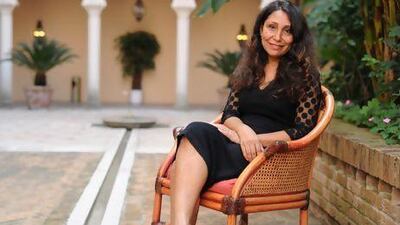Despite a society regarded as one of the world's most conservative, Saudi Arabia is, according to its most high-profile female film director, a land hugely rich for storytelling. "It's a very interesting place. It's very big and there's diversity and geography and cultures," claims Haifaa Al Mansour at the recently wrapped Doha Tribeca Film Festival, where she was sitting on the jury for the Made in Qatar section. Despite living in Bahrain, Al Mansour says she regularly returns to Saudi Arabia for creative inspiration: "I go to my mum's house every weekend to get stories."
Al Mansour made headlines earlier this year when her film Wadjda - considered the first to be entirely shot in Saudi - was screened at the Venice International Film Festival. Coming from a country where there are no cinemas and the issue of female drivers remains polarising, the film - about a girl growing up in the suburbs of Riyadh - caught the public's eye.
Despite receiving some backlash from traditionalists in her homeland for the film and subsequent media attention, Al Mansour claims she always tries to maintain a respect for her detractors.
"I don't want to be controversial for the sake of being controversial," she says. "I always try to speak to them, to open a dialogue and say: 'I respect you and I want to talk to you.' That way they respect me. They get upset, they may write some things on Twitter, but when they hear me speak, I speak their language, like a very local Saudi. They feel I'm their daughter, I hope."
Having opened this dialogue with the less liberal aspects of Saudi society, Al Mansour suggests the responsibility for creating a culture where cinema is accepted and, perhaps, where movie theatres are allowed to open, lies with the filmmakers themselves.
"You cannot say to the government: come on, give us film," she says, adding that this is a passive attitude that won't achieve anything.
"I think it's very important for filmmakers to try to make films that make people proud and embrace cinema, to make them see themselves reflected in a way that makes them think. This is a way to bring cinema in Saudi, to talk to the people and show them that you want to make films."
The yearning for such entertainment certainly exists in the country. Saudi boasts huge DVD sales and the internet has enabled people to bring films from across the world directly into their homes. It's little surprise that YouTube is the second most-popular website in the country. But the lack of actual movie theatres means that thousands of film-hungry Saudis travel to Bahrain and the UAE for the experience.
There are definitely movements within the country to change this, even though Al Manour says it "needs time". Three years ago, the multi-billionaire Prince Al Waleed bin Talal sponsored a film festival in Jeddah through his company Rotana, but it was banned by the authorities just hours before it was to open.
If and when movie theatres do return to the kingdom for the first time since the 1970s, Al Mansour hopes it's with the intention of providing a platform for local culture.
"I really don't care if they open a cinema and they show films from America or Bollywood films, films that are not from Saudi. If they will open theatres, I would love to see films from the country."
But forecasting when this might happen in a country where many still consider cinema to be corrupt and morally threatening is no easy feat. "It's difficult to predict the Arab world," Al Mansour says with a smile.
As for Wadjda, the film is still awaiting its first Middle East screening after premiering in Venice and screening at festivals around the world. "We've had lots of invitations," says Al Mansour. "We're still deciding."
Given the film was made with the help of the Dubai International Film Festival's Enjaaz post-production funding, there are high hopes it could be coming to the UAE next month.

